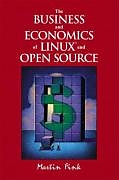Business and Economics of Linux and Open Source, The
Einband:
Kartonierter Einband
EAN:
9780130476777
Untertitel:
Englisch
Genre:
Betriebssysteme
Autor:
Martin Fink
Herausgeber:
Pearson Academic
Anzahl Seiten:
242
Erscheinungsdatum:
01.10.2002
ISBN:
978-0-13-047677-7
Autorentext
MARTIN FINK is General Manager for Hewlett-Packard's Linux Systems Division, where he has been leading Linux development activities for more than three years. He is responsible for driving HP's overall Linux and open source strategy and managing the firm's open source business processes. He is also Vice President of the Board of Directors for the Open Source Development Lab, a global consortium of industry leaders dedicated to promoting Linux and Linux-based programming for enterprise and carrier-class environments.
Klappentext
The manager's guide to using Linux and open source for competitive advantage.Using Linux and open source technologies, thousands of enterprises are cutting costs, gaining flexibility, and discovering powerful new sources of business value. Now, there's an objective, realistic manager's guide to using Linux and open source technology for competitive advantage. Martin Fink helps you get past both the hypesters and the naysayers, so you can accurately assess the benefits, costs, and risks of open source in your organization. Writing strictly from the manager's viewpoint, Fink covers every step of the Linux and open source project lifecycle, and every crucial issue, from licensing to collaborating with the open source community of developers. Coverage includes: Assessing the costs, benefits, and risks of pursuing Linux and open source initiatives Open source licensing: avoiding the minefields Managing Linux and open source projects within your company Assessing the size, breadth, and capabilities of the open source community Building strong, positive, synergistic relationships with external open source communities The crucial role of Linux standards Integration, development, deployment, migration, coexistence, support, and training Understanding the difference between the Linux kernel and the Linux operating system Understanding and choosing Linux distributions How the open source paradigm impacts commercial software developers Open source business models: what it takes to make a profit from open source technology Applying the open source development methodology in a corporate setting"A thought-provoking analysis of the role of open source software in the corporate environment. A must-read guide for managers considering how open source can help their organization." -Tim O'Reilly, O'Reilly and Associates, Inc.
Zusammenfassung
For CIOs and Product Develoment executives, this book explores the business and economic issues associated with the world Linux and Open Source. This book is less about technology and more about business and development processes.
Inhalt
Disclaimer and Notices.
Acknowledgments.
Preface.
I. GROUNDWORK. 1. The Business of Linux and Open Source.
Linux Adoption. Crash Course in Linux and Open Source Lingo. Linux Workloads. Business Benefits. Inhibitors to Linux Growth. Who's Who in Open Source? Summary.2. Linux-Heart of the Operating System.
The Operating System. The Linux Kernel. Kernel Fragmentation (or Forking). Linux Kernel Development and Version Control. Multi-Platform Support. Linux on the Desktop. Vertical and Horizontal Scalability. Embedded Linux. Summary.3. Open Source-Navigating the Legal Path to Freedom.
The Freedom to Be Open Source. The Open Source Definition. Intellectual Property and Reciprocity. Dual-Licensing and Copyright Ownership. Licenses-Open Source and Non-Open Source. Export and Cryptography. Open Source Development Methodology. Summary.4. Communities and Organizations.
Linux. Web Services and Application Servers. Languages. Desktops and Office Productivity. Databases. Personal Digital Assistants. Clusters. Organizations. Summary.II. OPERATIONAL LINUX. 5. Distributions-Completing Linux.
Linux Distribution. Packages. Distribution Vendors. Non-Linux Operating System Distributions. Creating Your Own Distribution. Supporting Multiple Distributions. Standards. Summary.6. The Cost of Linux and Open Source.
The Costs. Adapting to an Imperfect Solution. Procuring Linux and Open Source Software. Modifying Open Source Software. Summary.7. Standards-One Linux.
Why Standards? Free Standards Group. Linux Standards Base. Linux Internationalization. Testing and Conformance. Specialized Linux Distributions. Summary.8. Operations-Using Linux and Open Source.
Deployment. Migration and Coexistence. Licensing and Purchasing. Support. Training. Summary.III. OPEN SOURCE IN BUSINESS. 9. The Corporate Bazaar.
The Cathedral and the Bazaar. Structure Follows Strategy. Structural Bazaar. Other Structural Elements. Gated Communities. Risks and Issues. Summary.10. Value as a Function of Time.
Pharmaceutical Industry. Open Source Effect on Software. Devaluation as a Competitive Advantage. Value Stuck in Time. Summary.11. Business Models-Making Money.
Know Your Value. Commercial Software and Linux. Support and Services Tied to Open Source. Aggregating and Enhancing. Commercializing with a Dual-License. Hardware. End-of-Life Model. Building an Ecosystem. Summary.12. Integrating Open Source Into Your Business.
Outbound Open Source. Inbound Open Source. IT Development. Indemnification. Summary.13. Human Resources-Getting Top Talent.
Employment Contracts. Participation Policies. Hiring the Right Person. Structuring the Teams. Hiring Visible Leaders. Summary.Appendix A. References and Resources.
Appendix B. Sample Copyright Assignment.
Appendix C. The GNU General Public License Reference.
Index.

Leider konnten wir für diesen Artikel keine Preise ermitteln ...
billigbuch.ch sucht jetzt für Sie die besten Angebote ...
Die aktuellen Verkaufspreise von 6 Onlineshops werden in Realtime abgefragt.
Sie können das gewünschte Produkt anschliessend direkt beim Anbieter Ihrer Wahl bestellen.
Loading...
Die aktuellen Verkaufspreise von 6 Onlineshops werden in Realtime abgefragt.
Sie können das gewünschte Produkt anschliessend direkt beim Anbieter Ihrer Wahl bestellen.
| # | Onlineshop | Preis CHF | Versand CHF | Total CHF | ||
|---|---|---|---|---|---|---|
| 1 | Seller | 0.00 | 0.00 | 0.00 |
